Cyril Josh Barker in Amsterdam News:
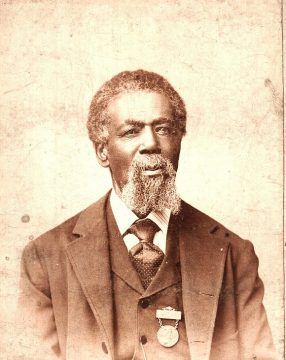 On Feb. 3, 1870, the Fifteenth Amendment was ratified prohibiting “the federal government and each state from denying a citizen the right to vote based on that citizen’s race, color, or previous condition of servitude” giving Black men the right to vote across the nation. Just under a month later the first African American vote was cast in Perth Amboy, N.J. on March 31, 1870 by Thomas Mundy Peterson. Born in 1824 in Metuchen, N.J., Peterson was the son of ex-slave Lucy Green. Peterson worked as a janitor and handyman in Perth Amboy. After the Fifteenth Amendment was enacted, Peterson participated in Perth Amboy’s local election held at city hall over the city’s charter. A member of the Republican and Prohibition Parties, he cast his ballot in favor of revising the existing charter, making him the first African American to vote in any election in the nation. Along with being the first Black person to vote in America, he was also the first Black person in Perth Amboy to serve on a jury. Peterson would go on to be one of seven people appointed to make amendments to the charter’s revisions he voted in favor of.
On Feb. 3, 1870, the Fifteenth Amendment was ratified prohibiting “the federal government and each state from denying a citizen the right to vote based on that citizen’s race, color, or previous condition of servitude” giving Black men the right to vote across the nation. Just under a month later the first African American vote was cast in Perth Amboy, N.J. on March 31, 1870 by Thomas Mundy Peterson. Born in 1824 in Metuchen, N.J., Peterson was the son of ex-slave Lucy Green. Peterson worked as a janitor and handyman in Perth Amboy. After the Fifteenth Amendment was enacted, Peterson participated in Perth Amboy’s local election held at city hall over the city’s charter. A member of the Republican and Prohibition Parties, he cast his ballot in favor of revising the existing charter, making him the first African American to vote in any election in the nation. Along with being the first Black person to vote in America, he was also the first Black person in Perth Amboy to serve on a jury. Peterson would go on to be one of seven people appointed to make amendments to the charter’s revisions he voted in favor of.
In 1884, in honor of his history-making ballot, the Perth Amboy community raised the equivalent of $1,800 in modern dollars to buy Peterson a gold medallion featuring Abraham Lincoln’s profile. “Presented by the citizens of Perth Amboy, N.J. to Thomas Peterson the first colored voter in the provisions of the 15th Amendment at an election held in that city March 31st 1870,” the medallion’s inscription states. Peterson died in 1904 at the age of 79. The medallion Peterson received is housed at the historically Black Xavier University of Louisiana in New Orleans. In 2017, the university loaned the medallion to the City of Perth Amboy for a presentation at St. Peter’s Episcopal Church. “During the 19th century, and even up to the present day, many communities have attempted to stop African Americans from voting. Perth Amboy is different, that is, we encouraged the right to vote,” said local businessman and historian John Kerry Dyke. “The Thomas Mundy Peterson medal is more than just an award. It represents the efforts of all good people that want to enfranchise America’s voters. It embodies the concept that all men are created equal.”
More here. (Note: Throughout February, at least one post will honor The Black History Month. This year’s theme is “African Americans and the Vote.” Readers are encouraged to send in their suggestions)
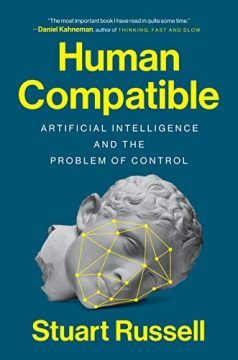 Clarke’s First Law goes: When a distinguished but elderly scientist states that something is possible, he is almost certainly right. When he states that something is impossible, he is very probably wrong.
Clarke’s First Law goes: When a distinguished but elderly scientist states that something is possible, he is almost certainly right. When he states that something is impossible, he is very probably wrong.
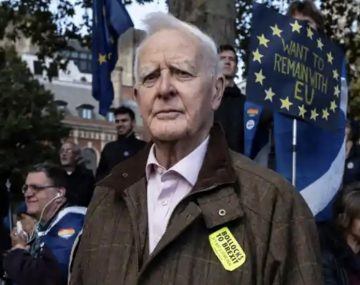 I’m not just a remainer. I’m a European through and through, and the rats have taken over the ship, I want to tell him. It’s breaking my heart and I want it to break yours. We need your voice to wake us from our sleepwalk, and save us from this wanton act of political and economic self-harm. But you’re too late.
I’m not just a remainer. I’m a European through and through, and the rats have taken over the ship, I want to tell him. It’s breaking my heart and I want it to break yours. We need your voice to wake us from our sleepwalk, and save us from this wanton act of political and economic self-harm. But you’re too late. Boasting wingspans of up to 11 feet—the largest of any bird alive today—these feathered goliaths, native to the Southern Ocean and North Pacific, are built to soar. Gliding at speeds that often exceed 50 miles per hour, they can
Boasting wingspans of up to 11 feet—the largest of any bird alive today—these feathered goliaths, native to the Southern Ocean and North Pacific, are built to soar. Gliding at speeds that often exceed 50 miles per hour, they can  At one point in A Very Stable Genius, the conservative lawyer
At one point in A Very Stable Genius, the conservative lawyer  On Feb. 3, 1870, the Fifteenth Amendment was ratified prohibiting “the federal government and each state from denying a citizen the right to vote based on that citizen’s race, color, or previous condition of servitude” giving Black men the right to vote across the nation. Just under a month later the first African American vote was cast in Perth Amboy, N.J. on March 31, 1870 by Thomas Mundy Peterson. Born in 1824 in Metuchen, N.J., Peterson was the son of ex-slave Lucy Green. Peterson worked as a janitor and handyman in Perth Amboy. After the Fifteenth Amendment was enacted, Peterson participated in Perth Amboy’s local election held at city hall over the city’s charter. A member of the Republican and Prohibition Parties, he cast his ballot in favor of revising the existing charter, making him the first African American to vote in any election in the nation. Along with being the first Black person to vote in America, he was also the first Black person in Perth Amboy to serve on a jury. Peterson would go on to be one of seven people appointed to make amendments to the charter’s revisions he voted in favor of.
On Feb. 3, 1870, the Fifteenth Amendment was ratified prohibiting “the federal government and each state from denying a citizen the right to vote based on that citizen’s race, color, or previous condition of servitude” giving Black men the right to vote across the nation. Just under a month later the first African American vote was cast in Perth Amboy, N.J. on March 31, 1870 by Thomas Mundy Peterson. Born in 1824 in Metuchen, N.J., Peterson was the son of ex-slave Lucy Green. Peterson worked as a janitor and handyman in Perth Amboy. After the Fifteenth Amendment was enacted, Peterson participated in Perth Amboy’s local election held at city hall over the city’s charter. A member of the Republican and Prohibition Parties, he cast his ballot in favor of revising the existing charter, making him the first African American to vote in any election in the nation. Along with being the first Black person to vote in America, he was also the first Black person in Perth Amboy to serve on a jury. Peterson would go on to be one of seven people appointed to make amendments to the charter’s revisions he voted in favor of.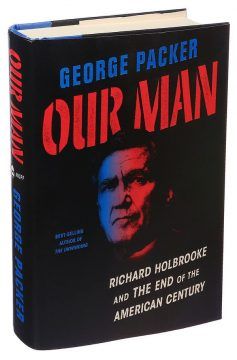 Samuel Moyn in The LRB:
Samuel Moyn in The LRB: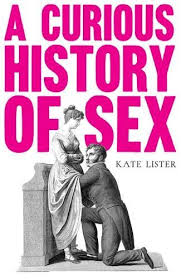 As late as the 20th century, grafting a monkey’s testicle on to your scrotum was considered a plausible cure for impotence and general sluggishness. As early as 1139, it was signed into canonical law that impotence was grounds for the annulment of a marriage, so you can see why the try-anything approach persisted, when a person could be unmade by physical failure, publicly ejected from the organising bond of society. Dough has reminded humans of sex, one way or another, pretty much since the cultivation of wheat began; any loaf of bread worth its salt was originally designed to resemble either a penis or a vagina. But much of the significance of food, especially in the early modern period, was not its erotic redolence but its mediating role in the bewitchery of carnal urges. So a wife might increase her husband’s ardency by keeping a live fish in her vagina for two days, then roasting it and feeding it to him. Or she might, conversely, set out to kill him by covering herself in honey and rolling in wheat, before grinding the wheat and turning it into bread, which she then fed to him. But she’d have to remember to mill it in the opposite direction to the sun, whatever that means.
As late as the 20th century, grafting a monkey’s testicle on to your scrotum was considered a plausible cure for impotence and general sluggishness. As early as 1139, it was signed into canonical law that impotence was grounds for the annulment of a marriage, so you can see why the try-anything approach persisted, when a person could be unmade by physical failure, publicly ejected from the organising bond of society. Dough has reminded humans of sex, one way or another, pretty much since the cultivation of wheat began; any loaf of bread worth its salt was originally designed to resemble either a penis or a vagina. But much of the significance of food, especially in the early modern period, was not its erotic redolence but its mediating role in the bewitchery of carnal urges. So a wife might increase her husband’s ardency by keeping a live fish in her vagina for two days, then roasting it and feeding it to him. Or she might, conversely, set out to kill him by covering herself in honey and rolling in wheat, before grinding the wheat and turning it into bread, which she then fed to him. But she’d have to remember to mill it in the opposite direction to the sun, whatever that means.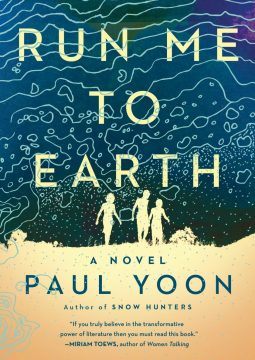 For those who don’t know about America’s involvement in Laos, which at the time U.S. officials called the “
For those who don’t know about America’s involvement in Laos, which at the time U.S. officials called the “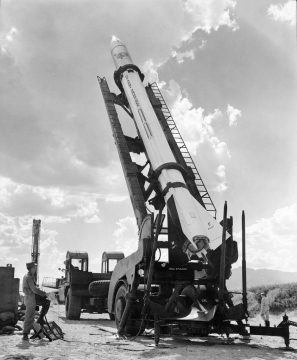 The early years of the American nuclear program were dominated by men in the mold of
The early years of the American nuclear program were dominated by men in the mold of  Getting rid of Trump means taking seriously “shit-life syndrome”—and its resulting misery, which includes suicide, drug overdose death, and trauma for surviving communities. My state of Ohio is home to many shit-life syndrome sufferers. In the
Getting rid of Trump means taking seriously “shit-life syndrome”—and its resulting misery, which includes suicide, drug overdose death, and trauma for surviving communities. My state of Ohio is home to many shit-life syndrome sufferers. In the 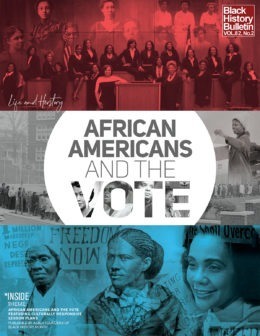 When Carter G. Woodson established Negro History week in 1926, he realized the importance of providing a theme to focus the attention of the public. The intention has never been to dictate or limit the exploration of the Black experience, but to bring to the public’sattention important developments that merit emphasis. For those interested in the study of identity and ideology, anexploration of ASALH’s Black History themes is itself instructive. Over the years, the themes reflect changes in how people of African descent in the United States have viewed themselves, the influence of social movements on racial ideologies, and the aspirations of the black community. The changes notwithstanding, the list reveals an overarching continuity in ASALH–our dedication to exploring historical issues of importance to people of African descent and race relations in America.
When Carter G. Woodson established Negro History week in 1926, he realized the importance of providing a theme to focus the attention of the public. The intention has never been to dictate or limit the exploration of the Black experience, but to bring to the public’sattention important developments that merit emphasis. For those interested in the study of identity and ideology, anexploration of ASALH’s Black History themes is itself instructive. Over the years, the themes reflect changes in how people of African descent in the United States have viewed themselves, the influence of social movements on racial ideologies, and the aspirations of the black community. The changes notwithstanding, the list reveals an overarching continuity in ASALH–our dedication to exploring historical issues of importance to people of African descent and race relations in America.